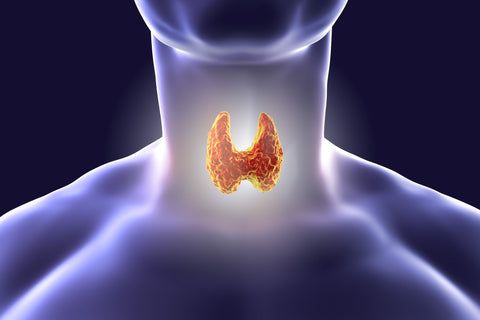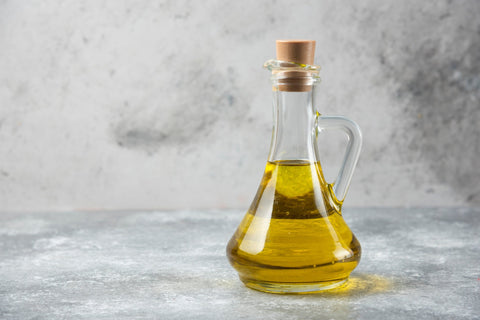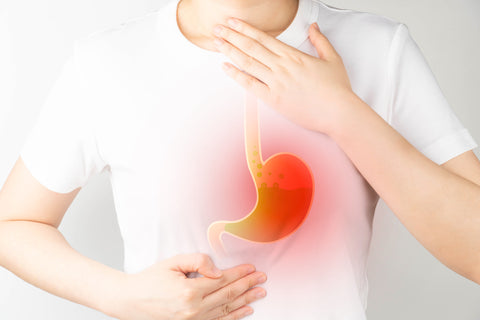What Is Iodine?
Iodine is one of the important essential nutrients, which means that it must be consumed in our diet. It is necessary to the production of the thyroid hormones thyroxine and triiodothyronine responsible for proper metabolism, regulating heartbeat and controlling body temperature. In hypothyroidism (underactive thyroid), therefore, body temperature tends to decrease because of a deficiency in thyroid hormone.
The thyroid gland is controlled by the pituitary gland. When the level of thyroid hormones (T3 & T4) are too low, the pituitary gland produces TSH (Thyroid Stimulating Hormone) which stimulates thyroid to make more hormones.
Recommended Daily Intake
It is suggested that iodine intake for adults should be at least 150 mcg per day. Pregnant should increase their daily consumption to 220 mcg and lactating women to 300 mcg.

However, Dr. David Brownstein who is regarded by many as an iodine expert suggests that the recommended daily allowance for iodine is way too low. As an example he points to the Japanese whose average daily intake of iodine is as high as almost 14,000 mcg per day due to their diet which is rich in sea weeds! It means that the daily iodine intake in Japan is almost 90 times higher than in America and over 100 times higher than in the UK, which fact may contribute to much better health status of Japanese people such low cancer rates in Japan. Some studies already suggest that it could be also the result of considerably higher intake of iodine which has been known of its antioxidant and anti-cancer properties.
Deficiency Prevalence
The BBC released a report in April 2011 demonstrated that iodine deficiency has become rampant in the UK. A study published in 2011 indicated that iodine-deficiency could be a huge problem also in the UK. According to the study 70 percent of UK girls age 14-15 are iodine deficient suggesting that this problem might be linked to IQ declines.
In the United States, however, although the health organizations tend to suggest that Americans consume adequate amounts of this mineral, yet some experts such as Dr. David Brownstein, maintain that almost all his patients are iodine deficient.
Key Causes of Deficiency
Unfortunately, since today plants often grow on soils which are deficient in iodine and thus they are low in this important mineral we are encouraged to use iodine supplements. It is estimated that our iodine levels have fallen by 50% over the past three decades as a result of the fact that soil often deficient in this mineral.
Apart from soil depletion there are other possible causes of iodine deficiency such as bromine which is a common endocrine disruptor. Bromide (compound that includes bromine) can get into our body with pesticides, soft drinks, breads or other baked goods, fluoridated water, plastic containers, medications, etc. Bromide competes with iodine to be used in the thyroid gland. In this way bromide leads to iodine deficiency in thyroid gland and inhibits thyroid hormone production resulting in slower metabolism, fatigue, hair loss, and other undesired symptoms.
Avoid toothpastes with fluoride, as it is toxic and competes with iodine for absorption and utilization, so less dietary iodine is absorbed, and iodine is absolutely essential for proper thyroid function. Drink only distilled or at least properly filtered water and take chlorella on a daily basis to remove fluoride from your body and brain. In addition, chlorella is also one of the best natural sources of iodine and chlorophyll.
Zinc, Selenium & Manganese Deficiency & Thyroid Function
Unfortunately, our diets are very often deficient not only in iodine, but also zinc, selenium, and manganese needed for adequate thyroid functioning.
Possible Consequences of Iodine Deficiency
A careful analysis of the scientific research dealing with iodine leads to the conclusion that iodine deficiency could be responsible for many underlying conditions such as goitres or the swelling of the thyroid gland, hypothyroidism (thyroid produces too little thyroid hormone) leading to fatigue and difficulty losing weight, ovary and breast cancer, or fibromyalgia, cold intolerance, dry skin, sleepiness, muscle pain, joint pain, constipation, depression, mental impairment, forgetfulness, menstrual disturbances, impaired fertility, inability to concentrate, etc.
Pregnant women are particularly susceptible to possible negative effects of iodine deficiency as adequate levels of this essential mineral are critically important for the proper neural development of the foetus.
In addition, iodine deficiency is known as the most common causes of preventable brain damage, mental retardation, and cognitive decline.
Natural Sources of Iodine
Since average daily intake of iodine of much healthier Japanese is as high as 14,000 mcg, it looks like we need much more than the recommended 150mcg of iodine a day.
The best natural sources of iodine are seaweeds and algae such as kelp (the highest source), chlorella and spirulina. Including any of these three algae in the form of tablets or powder as part of your regular diet will ensure you receive adequate amounts of iodine thus supporting your thyroid health and improving metabolism.
A research by Howell (1998) which involved British athletes found that the addition of kelp to their diet significantly boosted their energy and endurance levels and also improved competitive performance.
Using Celtic salt or sea salt instead of refined salt will help to increase your iodine intake too.
Synthetic Iodine Supplements
If you decide to use a synthetic form of iodine it shouldn’t be iodine but iodide (a stable form of iodine) as our thyroid has to convert iodine into iodide and as a result some harmful oxygen radicals will be produced.
Iodide supplementation is usually recommended in case of some nuclear disaster and radioactive activity as it protects thyroid by flooding it with iodine to prevent it from absorbing the radioactive form.
Avoid Overdosing
Normally hypothyroidism takes place as a result of iodine deficiency which causes thyroid to produce too little thyroid hormone and thus leading to fatigue or difficulty losing weight. Ironically, the same may occur as a result of taking too much of iodine. For this reason it is also important to avoid overdosing synthetic iodine.
Many people with overactive thyroid ask if it is a good idea to take kelp or other natural sources of iodine as they think taking iodine supplements may worsen their condition.
Well, it is possible, although in most cases iodine supplementation (especially in the natural form such as kelp, chlorella or spirulina) doesn’t cause problems in people with hyperthyroidism, all the more since deficiency of iodine is very common today due to soil depletion. Therefore, even those who suffer from overactive thyroid may be deficient in iodine which makes the problem even worse.
However, in this case I wouldn’t take more than one tablet of kelp a day or 5 tablets of chlorella or spirulina (both are lower in iodine than kelp) as overdosing iodine can exacerbate the autoimmune response in people with Graves’ Disease
Vitamin C & Magnesium to Improve Iodine Efficiency
Also proper daily intake of vitamin C and magnesium is important as it enhances the effects of iodine.
References
- Abraham GE, Brownstein D. Evidence that the administration of Vitamin C improves a defective cellular transport mechanism for iodine: A case report. The Original Internist. 2005; 12(3):125-130.
- - Loseva LP. Sep 1999. Research Institute of Radiation Medicine, Minsk, Belarus. 8th Int’l Congress of Applied Algology, Italy. Belarus.
- - Loseva L.P. and Dardynskaya I.V. Sep 1993. Research Institute of Radiation Medicine, Minsk, Belarus. 6th Int’l Congress of Applied Algology, Czech Republic. Belarus.
- - Qishen P., Kolman et al. 1989. In Toxicology Letters 48: 165-169. China.
- - Linus Pauling Institute: Iodine:
- - http://lpi.oregonstate.edu/infocenter/minerals/iodine/
- - Hollowell JE, et al. Iodine nutrition in the United States. Trends and public health implications: Iodine excretion data from National Health and Nutrition Examination Surveys I and III (1971-74 and 1988-94). J Clin Endocrinol Metab. 1998; 83:3401-3408.
- - Plummer H. Results of administering iodine to patients having exophthalmic goiter. JAMA. 1923; 80:1955.
- - Thompson W. Prolonged treatment of exophthalmic goiter by iodine alone. Arch Int Med. 1930; 45:481-502.
- - Thompson W. The range of effective iodine dosage in exophthalmic goiter. Arch Int Med. 1930; 45: 261-281.Trousseau, A. Lectures on clinical medicine. Vol. 1. Lecture XIX, Exophthalmic goiter of Graves disease, New Sydenham Society, London. 1868.
- - Vanderpump M Lazarus J Smyth P Burns R Eggo M Han, T et al. Assessment of the UK iodine status: a national survey. Endocrine Abstracts. Presented at the Society for Endocrinology BES 2011: 11 April 2011-14 April 2011
- - Garber JR, Cobin RH, Gharib H, Hennessey JV, Klein I, Mechanick JI, et al. Clinical practice guidelines for hypothyroidism in adults: cosponsored by the American Association of Clinical Endocrinologists and the American Thyroid Association. Thyroid. Dec 2012; 22(12):1200-35.
- - Ladenson PW, Singer PA, Ain KB, Bagchi N, Bigos ST, Levy EG, et al. American Thyroid Association guidelines for detection of thyroid dysfunction. Arch Intern Med. Jun 12 2000; 160 (11):1573-5.
- - Stuckey BG, Kent GN, Ward LC, Brown SJ, Walsh JP. Postpartum thyroid dysfunction and the long-term risk of hypothyroidism: results from a 12-year follow-up study of women with and without postpartum thyroid dysfunction. Clin Endocrinol (Oxf). Sep 2010; 73(3):389-95.
- - Woeber KA. Iodine and thyroid disease. Med Clin North Am. Jan 1991; 75(1):169-78.
Any information or product suggested on this website is not intended to diagnose, treat, cure or prevent any medical condition. Never disregard medical advice or delay in seeking it because of something you have read on this website. Consult your primary healthcare physician before using any supplements or making any changes to your regime.





